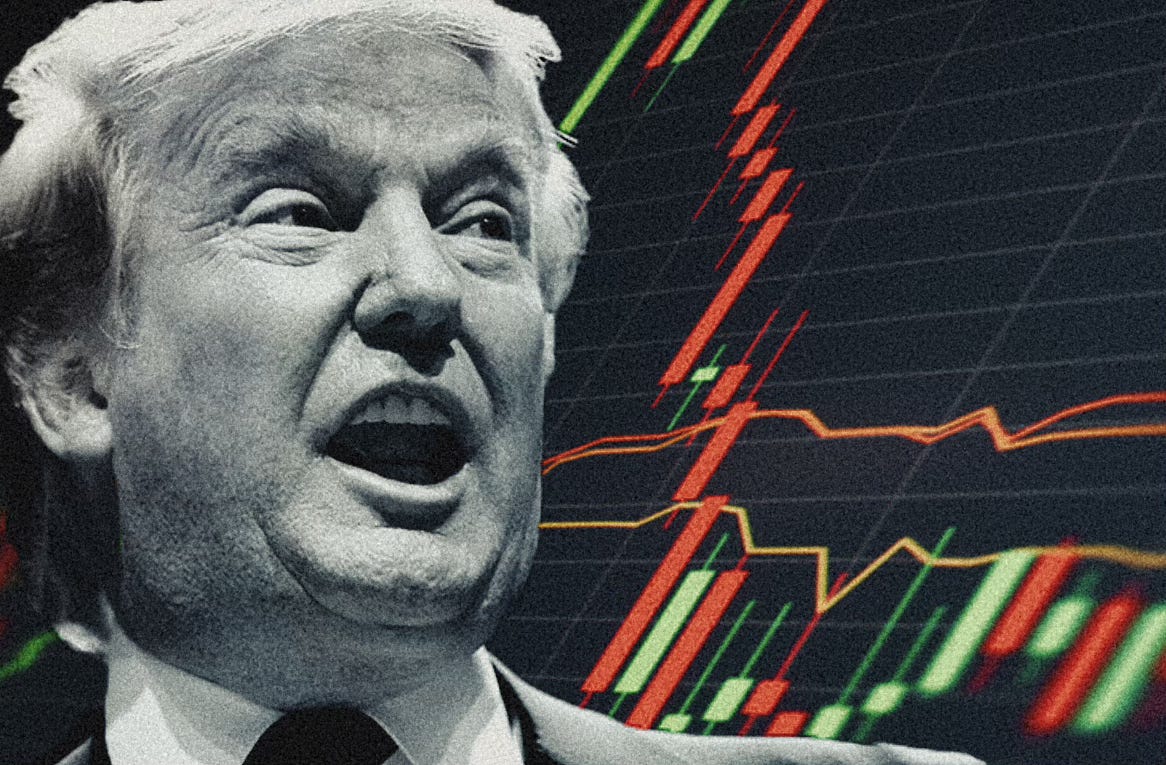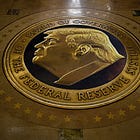Trumponomics Could Bring Far Worse than Inflation
Its combination of tariffs, fiscal profligacy, and easy money has the makings of a bigly economic crash
When Donald Trump backed away from his trade war—sorta—last week, most people attributed it to the collapsing stock market. But when he explained his change of course, Trump cited a different class of assets: U.S. government bonds—aka Treasuries—were falling in price, meaning the yield they were paying to attract investors had increased. “The bond market is very tricky,” Trump said. “People were getting a little queasy.” He stressed that things were now “beautiful” as bond yields jumped a little more—as if to spite him.
Since then, the media and Trump officials have offered various explanations for Treasuries’ behavior. Treasury Secretary Scott Bessent attributed it to “normal deleveraging”—investors needing to sell assets for cash—but he didn’t say much about why they needed cash. Media reports were more wary, typically saying investors wanted better yields (interest rates) because of the trade war, but further explanations were hazy.
It’s probably the case that investors are shifting their portfolios away from a U.S. economy that seems increasingly endangered by Trump’s presidency. (Further evidence of this: the depreciation of the dollar, the currency used to buy U.S. goods and assets.) They may also fear stagflation and are demanding higher yields because they expect the Federal Reserve will pump up the money supply (and push up inflation) in response. This is not an idle worry given Trump’s browbeating of Federal Reserve Chair Jerome Powell to cut interest rates, even triggering fears that he’ll abuse his executive power and take the unprecedented and prohibited step of firing Powell.
But there’s also a possibility of something much worse happening to the economy beyond inflation.
Historically, many economic catastrophes resulted from the discovery that some prominent asset wasn’t nearly as sound as people thought. The Great Depression followed the Federal Reserve’s decision to tighten monetary policy, resulting in deflation. The 2008 Great Recession followed the realization that U.S. housing—and financial instruments based on it—could substantially lose value. Some investors may be worried that, given both Trump’s chaotic policymaking and the United States’ grim long-term fiscal outlook, Treasuries could experience something similar.
Because of their perceived safety, Treasuries are often treated like bank accounts where investors can park their money. As such, they are a foundational part of the U.S. and the world’s financial systems. When the stock market began falling after Trump’s “Liberation Day” tariff announcement, many investors initially “fled to safety” in Treasuries, dropping the 10-year bond to a yield below 4%. Some even argued that the shift from private-sector investment to government financing was good because it lowered government borrowing costs.
Uncle Sam could certainly use the break because he’s under tremendous fiscal pressure. Federal debt is over $36 trillion as compared to U.S. GDP of $30 trillion. That will only grow in the coming years as Trump and the Republican Congress finance their wave of new and extended tax cuts with borrowed money instead of reduced spending. Beyond that, Medicare and Social Security expenditures have eclipsed revenues and the gap is growing; federal lawmakers—loathe to cut benefits or raise taxes to make the programs solvent—will borrow more money to cover the shortfalls. And no, Elon Musk’s DOGE efforts won’t alter this; even if we (very) charitably accept Musk’s latest (severely revised downward) pronouncement that DOGE ultimately will cut $150 billion in next year’s government spending, that is less than a tenth of Fiscal Year 2025’s federal budget deficit.
Simply put, the federal government will be selling a lot more bonds in the future. Who will buy them?
In recent decades, many buyers have come from overseas. U.S. trade deficits sent trillions of dollars abroad that came back to the United States in the form of investment—including the purchase of Treasuries. Nearly a quarter of the federal debt is held by foreigners or foreign governments. But Trump wants to zero out trade deficits, and he’s infuriating foreigners in the process. What happens if they stop “taking stock in America”?
To attract investors, the U.S. government will have to pay higher yields, like last week. Debt service is already one of the largest categories of federal spending, behind only Social Security and roughly even with Medicare, defense, and other health care spending. The federal budget—or the lawmakers who oversee it—may not tolerate devoting an even larger share to debt service.
And investors could worry that politicians, wanting to free up money for other spending, will force them to “take a haircut” on their Treasuries—especially given Trump’s business history of leaving investors in the lurch. That would mean investors would no longer see U.S. government bonds as riskless assets.
Given that the Great Recession resulted from investors realizing they had underappreciated the risk of housing-backed assets, imagine how much worse would be a similar realization about Treasuries. The government would pay much more for borrowing. The dollar’s status as the world’s reserve currency would erode further. And a foundational piece of the global financial system would crumple, along with related assets. The result could be historically catastrophic: a combination of the Great Recession (rising unemployment, stagnant wages, lost household wealth, fleeing investment) and 1970s malaise (high inflation, stagnant economy aka stagflation), with the Federal Reserve facing the bleak dilemma of whether to lower interest rates to boost the economy or raise rates to quell inflation. In other words, Americans could all at once confront loss of jobs or wages and higher prices that diminishes the value of the wealth they have accumulated in their home equity and 401ks.
To be clear, I’m not saying this will—or even is likely—to happen. Trump could sign “new” trade deals that, though little different from the status quo, would allow him to claim victory and back away from the trade war (as he’s done before). Investors—foreign and domestic—probably will continue to buy Treasuries, if only because there are few other “safe” assets. And the Federal Reserve (especially if brought more directly under the control of the president) would almost certainly try to backstop the bonds, even if the resulting flood of dollars ramps up inflation.
But Trump’s tariffs, fiscal policy, foreign realignment from pro-free world to pro-Russia, attacks on the rule of law, deportation of manual labor, and assault on civil liberties are already unleashing negative shocks on the economy and American life. Investors can no longer be in denial of the threat his ignorance, impetuousness, and illiberalism pose.
Could that lead to a Treasuries meltdown and a severe financial crisis? I admit, what I’ve written is an exercise in finding the worst possible economic outcome. But it is a possible outcome. And that’s plenty scary.
© The UnPopulist, 2025
Follow us on Bluesky, Threads, YouTube, TikTok, Facebook, Instagram, and X.
We welcome your reactions and replies. Please adhere to our comments policy.








For Trump , control and corruption are much more important than economy
I guess my only caveat is in the statement regarding HIS policies. His cultists still defend him. Still belive. So the proper pronoun is OUR